Clash of Titans
Games featuring a future Hall of Fame coach on each sideline.
January 2, 1939: Rose Bowl - Duke vs Southern California
Wallace Wade vs Howard Jones
The last four seasons before 1938 had been disappointing to USC fans as the Trojans went 17-19-6. Folks were beginning to say Coach Howard Jones had lost his touch. His '38 Trojans survived a down-and-up-and-down-and-up season. USC lost its opener, 19-7, to Alabama at home, then won six in a row, including handing California its first defeat in 18 games, before stumbling in the mud at Washington 7-6. The Trojans clobbered crosstown rival UCLA 42-7 and then took down #1 Notre Dame before 97,146 fans in the Los Angeles Coliseum to finish the season 8-2 and ranked #7 in fourth year of the Associated Press Poll. USC tied California for the top spot in the Pacific Coast Conference but secured the host spot in the Rose Bowl because they beat the Golden Bears head-to-head.
As the host team, USC got to pick their opponent. The school authorities chose Duke for the 24th Rose Bowl. Duke accepted its first bowl invitation in school history despite the fact that the Blue Devils finished the season #3 in the final Associated Press poll behind two other 10-0 teams, #1 TCU and #2 Tennessee.
Led by All-American co-captains C Dan Hill and TB Eric "The Red" Tipton, the 1938 Duke Blue Devils crafted one of the most remarkable seasons in college football history. Wallace Wade's eighth Duke squad since leaving Alabama won all nine games they played. They also shut out the opposition in every contest. That's right—they were undefeated, untied, and unscored on!
The team earned a nickname early in the season that lives on in history. After the 6-0 victory over Georgia Tech in the fourth game, Bill Cox, a reporter for The Virginian-Pilot, referred to the team as "The Seven Iron Dukes." The monicker stuck without the seven.
Duke Coach Wallace Wade was no stranger to Pasadena. He went as a guard-tackle on the Brown team that played in the 1916 Rose Bowl against Washington State. He also took three of his Alabama squads to Pasadena. The Crimson Tide edged Washington 20-19 in 1925, tied Stanford 7-7 the following year, and bested Washington State 24-0 in 1930.
Wade was a prime practitioner of "Southern football." Play conservatively and wait for the opponent to make a mistake. He preferred to punt the ball into enemy territory on third, second, or even first down than possess it deep in his own territory.
Some West Coast writers criticized Duke's selection, insisting that the Blue Devils faced "weak" competition in the Southern Conference, and Southern football in general was still regarded as inferior (despite Alabama's 2-0-1 record in Pasadena under Wade).
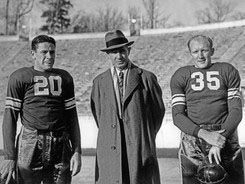
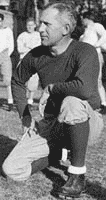
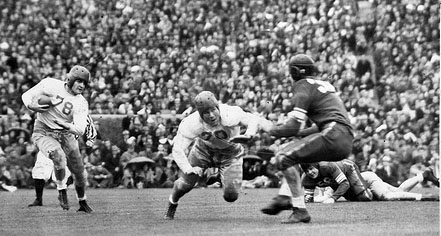
L: Eric Tipton, Wallace Wade, Dan Hill; M: Howard Jones;
M: Trojan G Harry Smith blocks for Granny Lansdell
Like Wade, Jones had yet to taste defeat as the Rose Bowl host team, having defeated Pittsburgh 47-14 in 1929, Tulane 21-12 two years later, and Pitt again, 35-0, in '32.
Despite Duke's outstanding record and higher ranking, West Coast scribes considered the Trojans to be too big, fast, and deep for the invaders from the East. The Rose Bowl was billed as a showcase for two triple-threat tailbacks, Duke and Grenville "Granny" Lansdell of the Trojans. Hurting the Duke cause were nagging injuries to Hill and speedy back George McAfee (who was destined for a Pro Football Hall of Fame career with the Chicago Bears).
The Blue Devils got an unexpected and unusual good luck charm for their trip to California. An anonymous fan mailed a pair of silk panties to "Eunice" Tipton and "Agnes" Hill. Some Duke fans decided to take similar panties to the Rose Bowl and place them on USC's goal posts after the game to replace the pants Duke whipped off the Trojans.
As Wade boarded the train, he was handed a good-luck letter from archrival North Carolina's student body. The Blue Devils were representing not only the state of North Carolina but the entire southeastern United States.
A record Rose Bowl crowd of 89,452 endured several bouts of rain to watch a game that some writers immediately labeled the greatest of the Pasadena series that began in 1916. But that opinion is debatable since you could have slept off your New Year's hangover until the middle of the third quarter and missed nothing important. Almost all the excitement was packed into the last five minutes of play.
Neither Team Comes Close to Scoring in First Half
The first half was a punting duel, with Duke generally winning the field position battle but not getting near the goal line. The Men of Troy attacked offensively more than Duke, which punted before fourth down many times in typical Wade style. Mickey Anderson and Ollie Day took turns relieving Lansdell at tailback without much success.
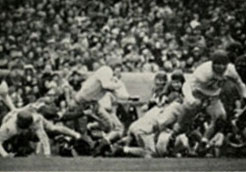
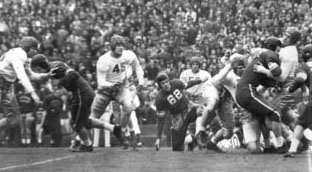
L: While Harry Smith leads the way, Granny Lansdell runs for USC.
What offensive adjustments did the wily Wade make at halftime to prepare his boys to receive the second half kickoff? Apparently not many because Duke punted on the first play!
Duke Breaks Scoring Ice
Finally, the Blue Devils got the break they'd been waiting for on Hill's midfield interception late in the third quarter. Tipton then fired a high, arching pass to George McAfee to put the ball on Troy's 24. Roger Robertson and Tipton punched their way to the 16. On fourth-and-two, third-string G Tony Ruffa booted a field goal from the 24 on the second play of the fourth quarter. Duke 3 Southern California 0
Since their Blue Devils had not surrendered a point all season, the Duke contingent waved their silk panties and let loose the Rebel yell in anticipation of victory. Countless Duke fans gathered around radios back in North Carolina shared the euphoria.
Blue Devils Turn Back Trojan Threat
USC couldn't get deep into enemy territory until Duke finally made a mistake midway through the quarter. Senior Bob Spangler unwisely tried to handle a punt on his own five only to have the ball get away into the hands of USC on the 10. Bob's teammates gathered around him and told him not to worry. They'd bail him out.
And that's exactly what they did. On first down, Lansdell lost four, then threw an incompletion. Granny ran the ball back to the 10 before USC incurred a 5y penalty for calling too many timeouts. Facing 4th down on the 23, Jones sent in kicker Phil Gasper to try a game-tying field goal that barely missed to the right. Duke fans waved their panties and roared even louder, convinced their heroes had withstood USC's last gasp.
Duke Fails to Use Up Clock Time
Given a chance to at least run some clock, Wade's charges reverted to their usual strategy. After gaining little on first down, Tipton punted!
The Trojans drove briefly before having to punt.
Given still another opportunity to control the ball, Eric the Red booted on second down again! (Remember, with limited substitution, coaches didn't send in plays.) Granny fair-caught the kick on the USC 39 to set up what might be the Trojans' last possession.
Trojans Finally Start to Move
With Duke in what today would be called a "prevent defense," Lansdell cut over right tackle for 5y. Then FB Bob Peoples circled left end, cut back, and ran into Perdue for only a 1y gain. Granny tried the same side to the Duke 48 for a first down. The tiring defense called a timeout to regroup to preserve their unsullied record for four more minutes.
Continuing to run to the left, Lansdell moved to the 43. Then "Antelope Al" Krueger took the ball on an end around for only 2y. On third and three, Lansdell threw a ball clear across the field toward Peoples, who leaped and grabbed it between Spangler and Tipton for a first down on the 34.
Jones Makes Change at Tailback
With only two minutes left, USC had to pick up the pace. So Coach Jones made a fateful change at tailback.
Doyle Nave hadn't seen much action for USC in 1938. As fourth-string tailback, the junior from Los Angeles had played only 35 minutes in the Trojans' ten regular season contests. Even if he had played the entire 60 minutes in the Rose Bowl game, he wouldn't have amassed the 175 minutes required to earn a letter. With two minutes remaining, he had yet to step on the playing field that day.
E Norman Bing recalled: "I was not one of Jones' favorites. I was not too close close to him, but we all enjoyed him. He played favorites. Everybody has his own opinion. Doyle Nave was a good friend and could throw like crazy, but Jones didn't care for him much. He didn't like the way he played, but he could pass very well."
QB Ambrose Schindler recalled: "Quarterback Doyle Nave was fourth-string; end 'Antelope Al' Krueger was third-string. In another offense, either guy would have started, they were great athletes—fast, and Nave could throw—but neither was entirely compatible with Jones' offense. But Duke was unprepared for Doyle's passing effectiveness."
As USC took possession for its last thrust, Coach Howard Jones told his best passer to begin warming up. Jones had this dialog with the youngster.
"Doyle, I'm thinking of putting you in."
"What have you got in mind, coach?"
"The 27 series. Get the ball to Krueger. He's the best end we have for getting open."
Nave recalled: "Jones gave me a few minutes to warm up, and I was nervous. I'll tell you."
Finally, with two minutes remaining and the Trojans with 1st-and-10 on the Duke 34, Jones sent his best passer into the game. Or did he?
In his 1989 book, The Tournament of Roses, Joe Hendrickson wrote this story about Joe Wilensky, the former Trojan lineman on Jones' coaching staff.
Wilensky was manning the telephone on the bench, relaying the messages of the assistant coaches who had been observing the action high above in the press box. Suddenly Wilensky got an idea. He decided to take a chance to do something to pull out the victory. He knew the coaches above had already left the press box and were on their way to join the team. Nobody had scored a point all season against the great Duke line.
"Our only chance is to get Nave in there to pass," thought Wilensky. "He has the arm to hit Krueger and dent this great Duke defense." Wilensky snatched the phone. "Yes," he shouted so everybody on the bench could hear. "Yes, yes–I get it. I'll tell him right away." Wilensky slammed the receiver on the hook and excitedly nudged assistant coach Bill Hunter.
"The word is to send in Nave and have him throw to Krueger," said Wilensky to Hunter, who in turn passed it on to Jones. Nick Pappas, who helped Jones with the coaching ... verified that this is the true story of how Nave got into the game.
Unexpected Hero Bails Out Trojans
At any rate, Nave rushed into the game, and Jones didn't stop him. Doyle wore a bandage over a cut on his forehead that he had sustained in a scrimmage.
On the opposite sideline, Coach Wallace Wade had no scouting report on Nave. The man Wallace assigned to scout the Trojans said later that, if they had known the bench-warmer had the best arm on the team, they would have rushed him hard.
As darkness set in with no lights in the Rose Bowl, Nave wasted no time putting the pigskin in the air. With Duke playing a prevent defense that involved rushing only one man, Krueger told Doyle: "Just fade back with the ball and throw it to me when I give you the sign by waving my arms, no matter where I go."
Krueger split time at left end with Bill Fisk. Al played the second and fourth quarters, as he explained years later. They put Fisk and the heavy team in first to wear the opposition down, and then let the light ones score the touchdowns.
Al also recalled that he didn't second-guess the decision to remove Lansdell for Nave. "I just wanted to win the game. That was the only thing on my mind."
With Duke rushing only one man and dropping ten back, Nave began with a button hook pass to Krueger for 12y. Doyle felt most comfortable with Krueger because they were both subs. Let Nave describe the next play.
"The second pass was a ‘27’ with a flair, and Al went down and did a pivot and broke to the outside. He caught that and gave us a first down."
With the ball on the left hash mark, Nave called a play to get the ball into the middle of the field to give Al more room to maneuver on the left side. "It was a ‘27 end-around.’ Krueger came behind the line of scrimmage and caught my third straight pass, but a Duke lineman picked him up, and we lost a few yards."
With under a minute on the clock, Nave sent Antelope Al on a down and out into the end zone. To shake Tipton, the receiver suddenly stopped, then raced to the corner of the end zone while Doyle dropped deep to his right and hurled the ball as hard as he could diagonally across the field to the back of the end zone. Wide open and waving his arms, Krueger grabbed it with 40 seconds left to score the first points against Duke all season and send the USC partisans into a frenzy.
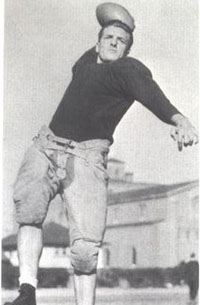
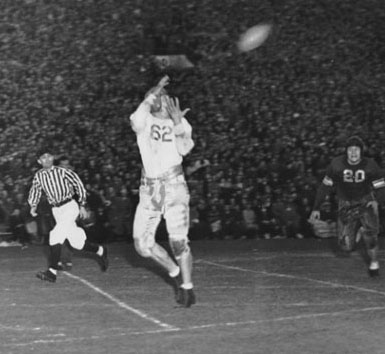
L: Doyle Nave; R: Al Krueger catches the TD pass as Eric Tipton (20) looks on helplessly.
Nave recalled: "I was watching Al as he broke away from Eric Tipton. I threw the ball when he was on the 7 or 8y line heading for the left corner of the end zone. He had good hands, and I was praying that he could catch it–nothing's a sure thing in football. He made a terrific catch in the chest, and we just went berserk."
Seated in his usual spot on the bench, Wade couldn't see the winning touchdown since his players were bunched together on the sideline, blocking his view.
"Did he catch it?" asked the usually calm coach anxiously. "Yes, coach," said George McAfee. "He caught it."
The winning play duplicated the one the Trojans had used to score in the last seconds of the first half to break the scoreless tie against Notre Dame except that Ollie Day had thrown that one to Krueger.
Jones removed both of his heroes to put in defensive replacements. The Blue Devils tried to score, but the game ended when Tipton connected with McAfee who broke loose for 17y before the last Trojan caught him at the USC 40.
Southern Cal had won its fourth Rose Bowl without a loss. The USC students tore down the goal posts at both ends of the field. Players and spectators hoisted Nave onto their shoulders and carried him off the field.
Postgame
As writers flocked to the USC dressing room, Nave approached Coach Jones. "Thanks for the chance, coach."
"No, Doyle, it is I who thank you. I hope that what you just did out there will make up for the rest of the season. I tell you, this was worth waiting for."
"It surely was," replied the blushing hero.
Jones gave no hint of Wilensky's story. Instead, he said: "Granny Lansdell was going great in those last few minutes, and I think that had there been more time he might have scored. But our only chance was to pass, and Nave is the best passer I have on the squad. I knew that Nave was the only man we had who might win the game for us at that time, and so I sent him out there and told him to get at least one of them off to Krueger."
When asked if Nave would receive a letter despite not playing the necessary number of minutes in the season, Jones agreed to waive the rule. "He's played enough to win anything he wants from me. Sure, it includes a letter." (Actually, the Athletic Board had to approve the recommendation, which it did.)
Duke coach Wade was not a happy camper after the game. "We were all right as long as they didn't show us more than three teams. But when they came up with fresh and talented fourth-stringers, it was too much."
But Wade wouldn't admit that USC was the best opponent his team had faced that season. He ranked Pittsburgh as the strongest team in the country, with Tennessee, whom Duke had not played, right behind them.
The Duke coach also made a puzzling remark that reporters interpreted as sour grapes. "This is a helluva place to bring a football team." Duke's attitude led some writers to claim that TCU should have been invited.
Wade went to the USC locker room after the game to congratulate Coach Jones. After doing so, Wade was leaving when a reporter asked if he would shake Doyle Nave's hand. The dejected coach replied, "I've had enough of him for one day."
The West Coast writers seized on Wade's statement as evidence of poor sportsmanship. As a war of words broke out between the two coasts, Wade claimed that his practices had been spied on and vowed never to bring another team to the Rose Bowl.
When Nave was asked about being shunned, he pointed out that the Duke coach was not only preoccupied with the heartbreaking defeat but was also worried about his wife, who was ill back home in North Carolina.
With the Rose Bowl game broadcast across the country, the Legend of Doyle Nave took all sorts of turns. Supposedly more than 250 Southern girls sent him proposals of marriage, and he received "crush letters" from ladies in such places as Omaha NE, Ellensburg WA, and Fairbanks PA. The mayor of Gordo AL sent Nave a message appointing him acting mayor of that town for January 16, 1939. A bedridden boy in Forestville CO with infantile paralysis asked for an autograph. The National Association of the Deaf asked for confirmation of a report that Nave was hard of hearing. (He wasn't.)
Postscript #1: The Duke yearbook for 1939-40 didn't include a single word or picture about the Rose Bowl. Instead the USC yearbook said, "A reserve quarterback who technically didn't have enough playing minutes to his credit to get his letter and an end playing his first year of varsity ball teamed together to steal the 1939 Rose Bowl shown in four plays."
Postscript #2: World War II brought Nave together with Duke Co-captain Dan Hill on an aircraft carrier in the Pacific. Nave asked Hill: "When I came into the game, did you have any idea that I was going to pass?"
Hill replied: "Hell, no. We didn't even know who you were."
Nave also exchanged pleasant letters with Coach Wade during the war and visited the man whose dream season he had spoiled. (Wade served in the military from 1942-45.)
References
The Trojans: A Story of Southern California Football, Ken Rappoport (1974)
Tournament of Roses: The First 100 Years, Joe Hendrickson (1989)
The USC Trojans: College Football's All-Time Greatest Dynasty, Steven Travers (2006)
What It Means to Be a Trojan: Southern Cal’s Greatest Players Talk about Trojans Football, Steven Travers (2009)
Fields of Battle: Pearl Harbor, the Rose Bowl, and the Boys Who Went to War, Brian Curtis (2016)
The Trojans: A Story of Southern California Football, Ken Rappoport (1974)
Tournament of Roses: The First 100 Years, Joe Hendrickson (1989)
The USC Trojans: College Football's All-Time Greatest Dynasty, Steven Travers (2006)
What It Means to Be a Trojan: Southern Cal’s Greatest Players Talk about Trojans Football, Steven Travers (2009)
Fields of Battle: Pearl Harbor, the Rose Bowl, and the Boys Who Went to War, Brian Curtis (2016)